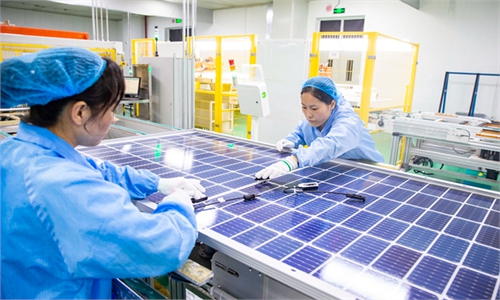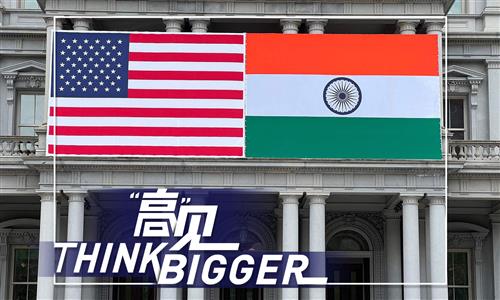
Illustration: Tang Tengfei/Global Times
Building a resilient supply chain is a serious challenge India faces as it tries to realize its ambition of making itself a new global factory for smartphone production. Meeting the challenge will require India's wisdom, so as to create conditions for further integrating itself into the world's value chain.
Ashwini Vaishnaw, India's minister of railways, communications, electronics and information technology, on Monday said that about 99 percent of the mobile phones used in India are domestically made, a total reversal from a decade ago when 98 percent were imported, according to the Hindustan Times. These two figures, if accurate, create a strong contrast that indicates the development of India's smartphone industry.
Meanwhile, there are questions about India's supply chain capability, which will help determine whether India can become a manufacturing powerhouse or just a "world factory" for assembly.
Citing a report by Counterpoint Research, the Times of India said in August that "made in India" smartphones have crossed 2 billion cumulative units, making the country the second-biggest mobile phone-producing nation in the world. As a result, mobile phone exports from India have surged. This creates an optimistic atmosphere, in which Vaishnaw was quoted as saying that "today, India has the potential to have export-led growth in the electronics sector."
Has India become a mobile phone manufacturing giant? Some economists gave a negative answer. For instance, former governor of the Reserve Bank of India Raghuram Rajan was quoted by media reports as saying in May that the boom in mobile phone exports might be a sign of concern, as the growth is happening on the back of assembly rather than genuine manufacturing within the country.
He argued that India's imports of mobile phone components - including display screens, cameras, batteries and printed circuit boards - shot up in the past few years, so manufacturers are likely engaging in only assembly in the country, according to media reports.
Some optimists believe India has the opportunity to replace China and establish itself as a global manufacturing hub, particularly in the areas of mobile phones and laptops, but India's supply chain disadvantage means there may be still a long way to go.
Although some statistics show that India now produces more and imports fewer mobile phones, this does not necessarily mean that the Indian smartphone industry's dependence on the outside world is decreasing. On the contrary, its dependence may be increasing, especially in terms of raw materials and intermediate products.
Attracting multinational corporations to build factories and assemble mobile phones in India is just the first step. India will need a long time to establish a complete smartphone manufacturing industry chain, including core components such as chips. Until then, India will have to depend on global supply chains for imports of intermediate goods.
In sharp contrast to India, China has comprehensive advantages in the industry chain. The country has the most complete industrial categories and industrial systems in the world, with leading industry chain support systems, strong resilience and great potential. China has experienced rapid technological progress. In an era of globalization, China has become an important exporter of intermediate products and key components.
India is focusing on attracting international mobile phone manufacturers to set up factories in the country for production, but it may ignore the fact that many manufacturers have deep connections to China's smartphone supply chains. For instance, as reported by Bloomberg, China has long been at the heart of Apple's supply chain. If India wants export-led growth in the electronics sector, it may have to further integrate itself into the world's industry chains and increase intermediate product imports from China.
In this context, India should provide an open and fair business environment for Chinese firms and show greater tolerance for its trade deficit with China. This requires politicians in India to demonstrate political wisdom by doing what is right, not what is easy and politically expedient in handling India's economic and trade relations with China.
The author is a reporter with the Global Times. bizopinion@globaltimes.com.cn



